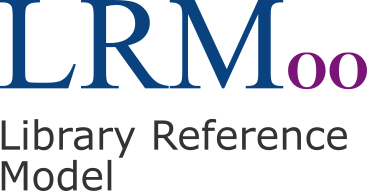Posted by Frédéric Julien on 1/03/2021
Dear LRMoo editors,
I read through the LRMoo 0.6 documentation, and I have a few questions about the proposed deprecation of F20 and F25.
LRMoo 0.6 proposes the deprecation of F25 Performance Plan and the use of E100 Activity Plan in its stead. LRMoo 0.6 further proposes the deprecation of F20, but does not provide any information as to which class should be used in its stead.
These deprecations and the substitution of F25 with E100 Activity Plan seem to situate the live performance (and related endeavours) entirely outside of the Work-Expression-Manifestation-Item model. Is this really the intent of LRMoo?
And is there any information you can share about the deprecation of F20 and your intended model for performing arts endeavours?
I am asking these questions because the international performing arts community is currently rolling out important modelling and data population activities:
the Performing Arts Information Representation W3C Community Group is attempting to develop a harmonized core performing arts ontology.
the Linked Open Data Ecosystem for the Performing Arts (no website) is supporting the PAIR community group, while also encouraging the publication of linked open data.
Several groups are ingesting datasets into Wikidata (see our latest WMF project grant) and we constantly face new modelling questions which we seek to resolve by looking into existing conceptual models.
My colleagues and I are deeply committed to achieving semantically interoperability with as many conceptual models as possible, including CIDOC-CRM, FRBRoo and LRMoo. Any information you can provide us about LRMoo will help us achieve this goal.
Posted by Pat on 1/03/2021
Hello Frédéric,
Thank you for your question. I am very interested in hearing about your projects and use of FRBRoo and LRMoo. I am sending this first reply to include the other members of the LRMoo Working Group in the message.
LRMoo is still in progress, as is a transition document to map FRBRoo 2.4 to LRMoo. I am interested in knowing what information would be useful in such a transition document.
A first reaction: the performance plan itself, covering the when, where, who of the performance, is clearly an activity plan. E100 Activity Plan is a relatively new class in CIDOC CRM, and fits well as the superclass of F25 Performance Plan (which was declared in FRBRoo some years ago). It is outside of the WEMI stack, because it is the event and not the product (the recorded performance). In the aim of streamlining LRMoo (compared to FRBRoo) we sought to avoid specialized classes that don't have any specific content not already in the superclass. This is the case for F25, now that E100 is declared.
Posted by Frédéric Julien on 2/03/2021
Hi Pat,
Thanks a lot for your quick reply.
I fully appreciate your intention to avoid specialized classes. This being said, before you dissociate the central endeavour of the performing arts from the WEMI stack, I would encourage you to consider the following:
- The live performance is an event and it is also a product. From an economic standpoint, the performance is the main product of the performing arts value chain (and the recording is a by-product). The Conceptual Framework for Cultural Statistics defines live performance as a culture domain with its own value chain, in which final consumption takes primarily the form of paying a ticket for admission to a performance.
- The ideation, planning and execution of a live performance involves many creative processes to which are associated intellectual property rights (copyright and neighbouring rights). If IP is at play at all stages of the performing arts creation/production process, then one could make the case that it falls within the WEMI stack.
I would very much like LRMoo to be able to accurately represent creative processes associated with the performing arts. I have a difficult time imagining how this could be achieved outside of the WEMI stack, but perhaps you have plans to keep the successor to F20 within WEMI.
Posted by Pat on 7/3/2021
For Discussion:
An F25 Performance Plan is clearly an Activity Plan, but this class will be in CRMSoc (still in draft), not CRMbase. How should this be handled with LRMoo? There are other FRBRoo classes and properties to be transitioned to CRMSoc, but if LRMoo is complete prior to CRMSoc, these will need to remain in the LRMoo documentation. Should this be the same for F25, or should F25 be retained permanently as an LRMoo class and only linked to Activity Plan as a subclass?
F25 is the Performance Plan, not the performance itself (which is an activity F31 Performance). An activity is not a F1 Work or F2 Expression. In FRBRoo 2.4 an F20 Performance Work: R12 is realised in: F25 Performance Plan (subclass of both F2 Expression and E29 Design or Procedure) although an expression may be featured in the performance. Being able to buy a ticket to attend a performance doesn’t mean that the performance is a work, although this is a E96 Purchase.
There is a question of scope. LRMoo is focused on resources libraries can collect and make available to users. Libraries can collect recordings of performances, programs for performances, etc. but not the actual live events themselves. Archives may also have documentation around performances, but not the actual live events.
In the 49th joint meeting of the CIDOC CRM SIG and SO/TC46/SC4/WG9; 42nd FRBR – CIDOC CRM Harmonization meeting, PR presented the issue to the sig. The solution proposed at the sig (change the migration path of F25 to E29 Design or Procedure, given the unstable state of CRMsoc) is an easy fix.
Concerns were raised that F25 was poorly understood and was mistakenly used to document instances of performances rather than proper plans.
HW: PR to contact FJ and share the correct migration path for F25 with him.
Issue Closed
March, 2021.


